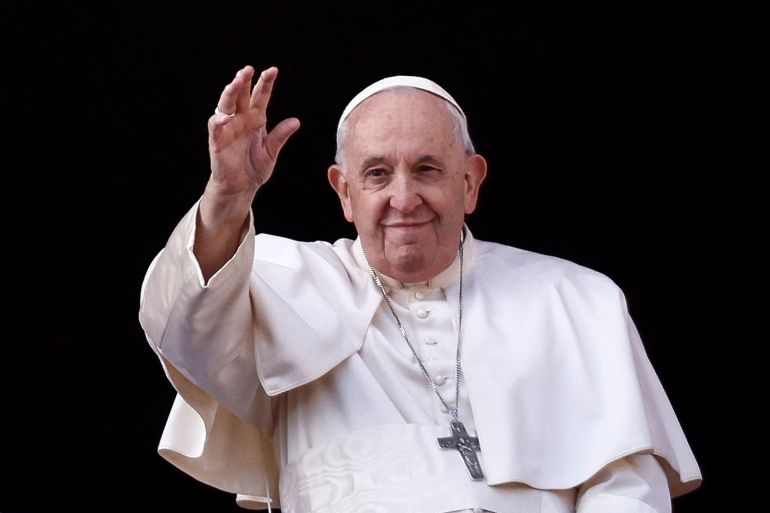South Sudan’s displaced hope pope’s visit will bring peace
There are 2.2 million internally displaced people in South Sudan as a civil war that began in 2013 continues to simmer.

After spending nearly a decade in a camp for the displaced in South Sudan’s Juba, Mayen Galuak hopes that Pope Francis’s visit to the capital city next week will inspire political leaders to finally restore peace, allowing him to go home.
The 44-year-old entered the United Nations camp, just a few kilometres from his residence, in search of safety three days after conflict broke out in 2013.
Keep reading
list of 4 itemsRussia-Ukraine war: List of key events, day 782
‘Crimes against humanity’ may have been committed in Sudan, says UN chief
The Take: How Iran’s attack on Israel unfolded
In the ensuing years, he has watched as South Sudan’s leaders forged peace deals and broke them; as militias carried out and denied ethnic massacres; and as relentless conflict pushed parts of the country into famine.
The 86-year-old pontiff is flying to Kinshasa, capital of the Democratic Republic of the Congo (DRC), home to 45 million Catholics, on Tuesday. On Friday, he heads to Juba, the capital of South Sudan, where he will be joined by the leaders of the Anglican Church and the Church of Scotland.
The six-day trip was originally planned for July 2022 but was postponed after Pope Francis suffered problems with his knee, which have recently forced him to use a wheelchair.
There were also concerns about his planned visit to the east of the DRC, where dozens of armed groups – including M23, which recently came within several miles of the commercial hub of Goma – roam.
The new itinerary no longer includes a trip to Goma, the capital of the North Kivu province, although the pope will meet victims of the conflict while in Kinshasa.
The Vatican’s envoy to the DRC has said the trip will remind the world not to ignore decades-long conflicts.
“We are in a bad situation … since 2013, we have not seen any good peace,” said Galuak, who says he cannot travel to his birth home in South Sudan’s north because of the risk of attack. Sporadic clashes continue to kill civilians throughout the country.
South Sudan gained independence in 2011. Two years later, conflict erupted when forces loyal to President Salva Kiir clashed with those loyal to Vice President Riek Machar, who is from a rival ethnic group.
The bloodshed spiralled into a civil war that killed at least 400,000 people.
A 2018 deal stopped the worst of the fighting, but parts of the agreement, including the deployment of a reunified national army, have not yet been implemented.
Many displaced people say they will not feel safe until the unified forces are deployed.
“If there was peace, we would have returned to our homes,” said Nyalon Gatfan, a mother of four at the Juba camp.
Many of the 52,000 others living in the camp hope a first-ever papal visit will see leaders honour the agreement.
There are 2.2 million internally displaced people in South Sudan and another 2.3 million have fled the country as refugees, according to the UN.
During the past six months, life in the camp has grown harder. In June, the UN cut food aid to South Sudan because of inadequate funding.
“Nowadays, we eat once a day,” said Gatfan.
Conflict, climatic shocks, and economic crises are plunging the country deeper into food insecurity. The UN said 7.76 million people – about two-thirds of South Sudan – are likely to face acute food insecurity this year.
“I want the pope to tell our leaders to understand the suffering we are going through,” said Gatfan.